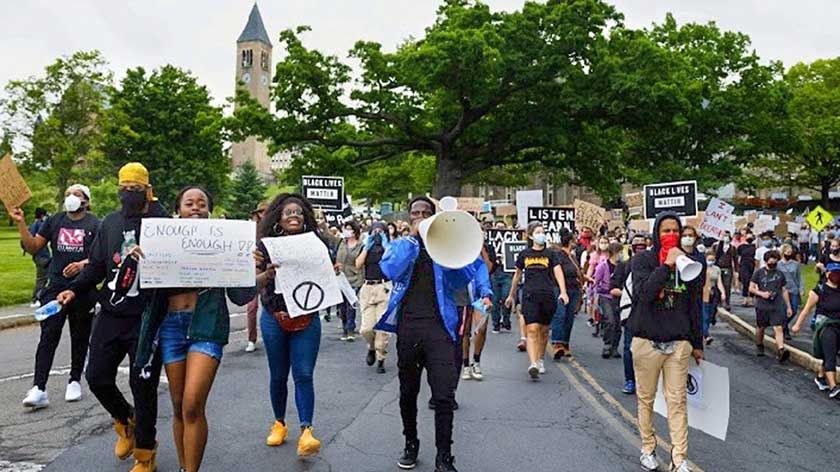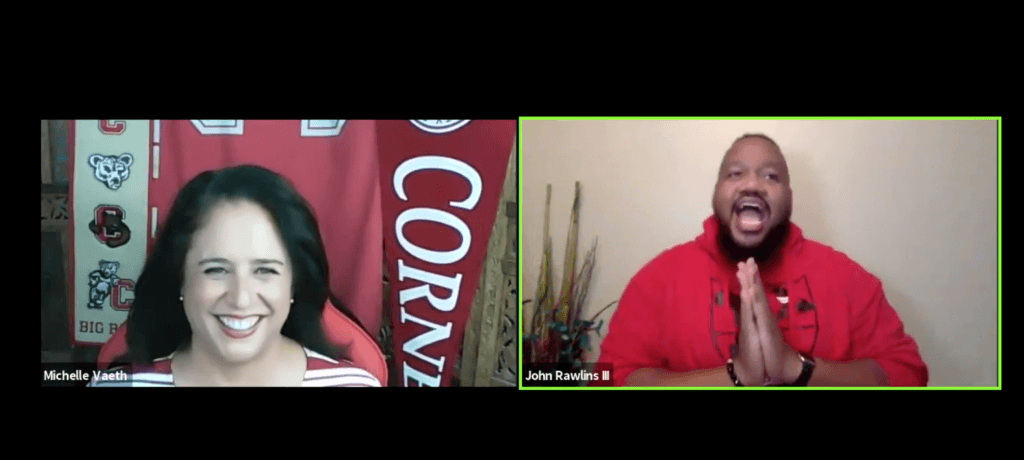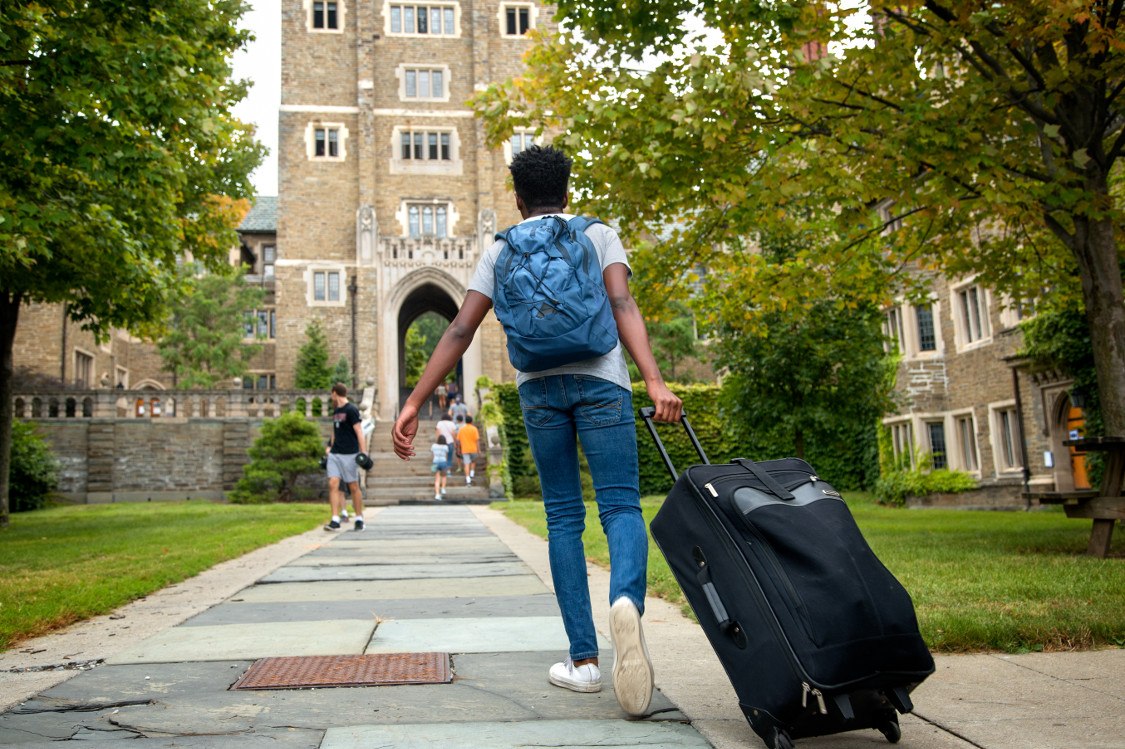Cornell alumni have always made it their mission to support the next generation of Cornell students. This is especially true in 2020, and helping current students is a key priority for the Cornell Black Alumni Association (CBAA). CBAA members provide support for Black alumni and students through scholarships, networking opportunities, social programming and other resources.
CBAA President John W. Rawlins III ’06 says alumni involved with the organization continue to step up in new ways to do what they can to support students, even during a difficult year.
“Our alumni have a wealth of experience, expertise, and knowledge that we can pull from, and we want to make sure we advocate for the Black student experience,” Rawlins says.
Sparking change
In June 2020, Cornell Students for Black Lives (C4BL), a coalition of 185+ student organizations, came together with CBAA to raise over $100,000 in support of racial justice. The fundraising effort included programs across the country and here at Cornell.
Students in some of the organizations reached out to Rawlins, who immediately jumped at the opportunity for CBAA to help. “I wanted to make sure that it wasn’t just our organization simply sending an email and then folks giving,” Rawlins says. “I wanted to make sure there was meaningful interaction and figure out how we do this from a strategic standpoint, as a group.”

Jason Daniel Fair ’07, CBAA’s vice president for fundraising and scholarship, says that CBAA members have been focused on how to add value in a way that helps build capacity and momentum within Black student organizations at Cornell.
“We already partner with a number of student organizations and support their goals throughout the year,” Fair adds. “What made this different is that this was a grassroots movement of different student organizations. We wanted to make sure we could offer some of the same guidance we’d been doing, [but] in a more organized fashion now for these amazing young people who put together something that was unprecedented.”
Sherell Farmer ’22, one of the student leaders of C4BL, says the support from CBAA has helped her and her peers “continue to make a better Cornell and a better future for ourselves. With talks ranging from events their student organizations put on in the past, to law school and ways of continuing to make life better for Black Cornellians, CBAA has truly transformed my Cornell experience and inspired me to continue to stand up and fight alongside my peers.”
Engaging on campus
Although the students originally planned to donate funds raised in the June campaign to mostly advocacy-focused organizations, C4BL and CBAA refined the list of beneficiaries in order to best match the impact goals of donors as the campaign grew. Funds will now support direct-service initiatives in Ithaca and NY, including the Greater Ithaca Activities Center (GIAC), the Multicultural Resource Center (MRC), Southside Community Center, the Audre Lorde Project, and NAACP Legal Defense Fund (LDF). Some of the funds will directly support new Cornell community initiatives. A percentage of donations received will be used to “finance education and advocacy for Black liberation at Cornell, guided by C4BL and CBAA,” according to the campaign’s GoFundMe page.
CBAA members hope to help students expand support for Cornell-specific programs through a future campaign.
“We are working with those students to figure out how we support and engage Black students and really amplify student voices,” Rawlins says. “We are figuring out how we work together on some kind of campus initiative that will bring light to these issues and further engage the entire student body on campus.”
The goal, Rawlins adds, is to “have the conversation about what’s going on in our world, but also put a focus on that education and that advocacy at Cornell, as well.”
Fair agrees. “Our focus is on long-term projects that will have a systemic impact on improving the quality of life, the experience of education at Cornell, for students and beyond,” he says.
Starting dialogue
The June campaign was just one way CBAA, current students, and other Cornell community members have come together over the past few months to create change and continue important conversations about diversity, equity, and racial justice. Cornell’s first Virtual Reunion in early June, shortly after the death of George Floyd and the beginning of nation-wide protests, brought together a number of panels and community discussions focused on these topics. CBAA members were involved in planning many of these events, something Rawlins says was a meaningful partnership.
“The staff made this conscious effort to pivot to acknowledge what was going on in our country – that literally had happened days before we were to gather together as a campus,” Rawlins says. “To use this as an opportunity to educate individuals on our campus and in our community made so much sense, but I think there are other universities that may have shied away from it or not said much.”

Rawlins and Fair hope to continue amplifying these topics, to ensure they remain part of community conversations in perpetuity.
“A lot of times, when we see these larger social issues happening, there’s this groundswell of support, and then eventually just because of life, the conversation becomes a little less and less – but not for those folks that are impacted,” Rawlins says. “How do we, as a community, as allies within a community, continue to have these conversations and educate? We can’t ignore these issues.”
Farmer looks forward to these continued conversations between alumni and students, and hopes more alumni will mentor or offer guidance to students in the coming year. “Knowing the past helps avoid mistakes in the present,” she says. “Alumni are crucial knowledge databases and so important to ensure that student organizations continue to innovate and serve their members and the Ithaca community to the best of their ability.”
Eyes on the future
The partnership between CBAA and student organizations will extend throughout the fall semester and over the coming years. Rawlins says he hopes alumni and university leaders will continue amplifying the voices of students and listening to their unique stories and needs.
“As we talk across the various generations, our experiences all differ,” Rawlins says. “We want to make sure that what the students feel like they need now is heard, is supported.”
Rawlins points to the Do Better Cornell initiative and how students have been directly communicating with the president’s office as one example of students using their voices to spark change – something he and CBAA members are hopeful will continue.
“My hope is that this momentum is an opportunity for us to engage more with young people on campus,” Fair says, “to let them know when they graduate, and even now, they have access to a whole network of people – that they are not alone. The Cornell experience should not stop once you graduate. We know there is value in connecting and being in community with other Black Cornellians.”
Farmer would also like to see these new networks strengthen.
“As alumni, you have experiences we as undergraduates have yet to experience,” she says. “You also have had time to meditate on your Cornell experience,” she adds. “I hope to see you all bring your experiences, your enthusiasm, your love of your campus organizations, and your love of Cornell in the future as you all continue to work with student organizations.”
“I don’t think this work is really ever done,” Rawlins says. “That’s not just a Cornell thing – that’s across our country and around the world. This is an opportunity for Cornell to really show who we are as a community, as a campus, as leaders.”
Update, November 2020: Funds from the June campaign were successfully distributed. The Greater Ithaca Activities Center (GIAC), the Multicultural Resource Center (MRC), Southside Community Center, and the Audre Lorde Project each received $25,000, and the NAACP Legal Defense Fund (LDF) received $15,000. Additional funds are to be distributed to Cornell-specific initiatives.
“GIAC and Southside have really struggled during the pandemic,” says Matt Carcella, director of Diversity Alumni Programs. “This could be important budget relief for them right now, to make sure they stay open.”


